Conversations that Matter is a virtual event series hosted by our Diversity & Inclusion Council that came to be due to unfortunate circumstances. After the murder of George Floyd, the Black community was in pain and mourning while the rest of us (some for the first time) were awakened to the inequality and injustice that still exists in the world. The first series of Conversations that Matter focused on the topic of police brutality. Our community could register and attend this virtual event to come together in a safe space to share vulnerability, experiences, and learning from our colleagues about our different lived experiences and how we were understanding the current events around us.
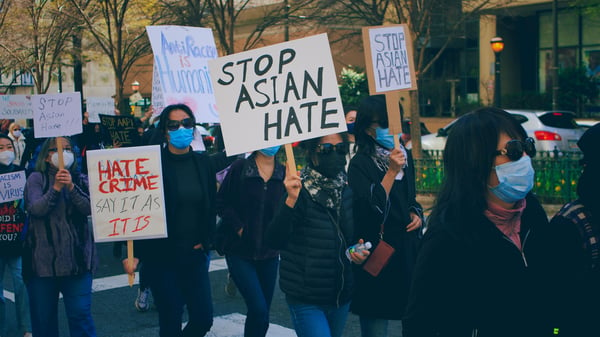
In 2021, Populus Group identified “evolving our diversity and inclusion” as a defining objective. Identifying defining objectives for the organization is something we do each year to ensure we stayed aligned and focused on the right things both as an organization and as individuals. While D&I has always been a part of PG’s DNA, it’s now a core pillar we can all stand behind. We have the opportunity to focus on changing and advancing PG’s culture to create a more diverse, inclusive, and equitable workplace. As we evolve diversity and inclusion, Conversations that Matter remained an important way to ensure we're having the important and difficult conversations needed to become more aware, educated, and connected. Our most recent series focused on the Stop Asian Hate movement.
While unfortunately this subject came to our attention due to the mass shooting in Atlanta, it’s a subject that’s weighed heavily on the Asian community for over a year—this pandemic has aggravated and increased hate against them. Three people from our community Rosemarie Fontela, Max Barry, and Joy Bartolome each had different reasons for creating this event.
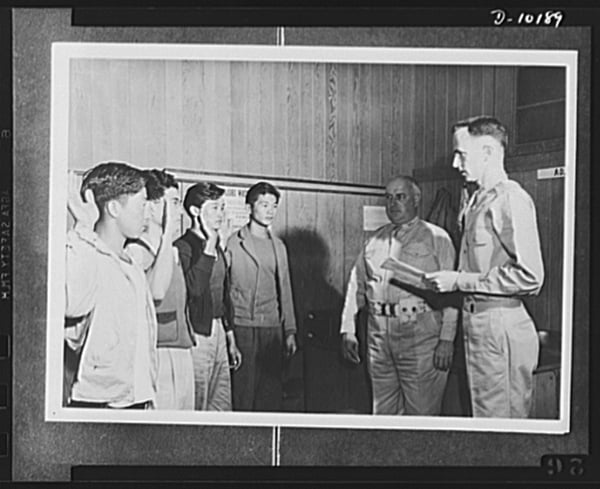 Japanese American volunteers during World War II via Library of Congress
Japanese American volunteers during World War II via Library of Congress
For Rosemarie, it came from what she says was a level of embarrassment. After the morning of the Atlanta shootings, she felt lost, not knowing how to be the right mom to guide her children, the right manager to guide her team, and the right support system for her fellow AAPI community members. The next morning, she called Joy to just talk and vent and realized a few things: the need to acknowledge her desire to learn more about the issues and violence facing the AAPI community, the desire to stop being quiet about the increase in hate crimes against the AAPI community, and the desire to figure out how she wanted to make an impact. And she wasn’t alone in this; Joy felt pretty much the same.
For Joy, the passion for D&I has been present her whole life and she’s always wanted to affect change some way, somehow. These issues hit close to home: as a Filipino American, she feared for her safety leaving the house, and feared even more for her parents because elders in the AAPI community have been heavily targeted. In every single video shared online on attacks against the AAPI community, she saw her own family members. She knew she couldn’t sit idly, knowing it could happen to her own loved ones. It was time to share her story and educate others on the history of hate. Knowing history and knowing the truth is a fundamental part of how we can change the world. It’s learning from the past that allows us to understand our present and to make better decisions now and for the future.
Max, a member of the D&I Council, reached out to Joy just in time, wanting to create a space for the AAPI community to discuss and process the recent shooting in Atlanta, as well as the increase in Asian hate worldwide. He knew our communities were hurting but as a white man, also understood the need to have AAPI voices leading the charge. It was his place to first learn and listen to best support Joy and Rosemarie in their interest in creating a place for an impactful conversation.
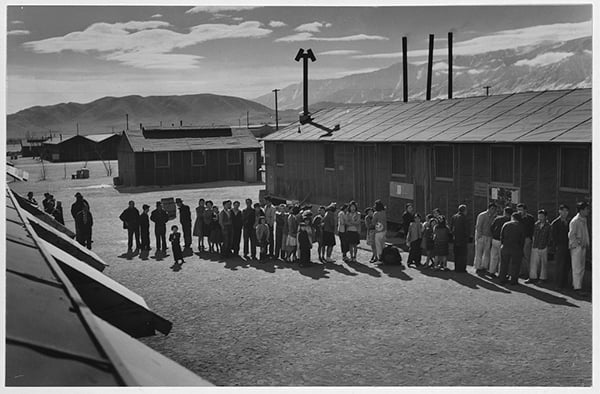 Mess line at Manzanar Relocation Center in California during Japanese Internment via Library of Congress
Mess line at Manzanar Relocation Center in California during Japanese Internment via Library of Congress
With the help of our D&I Council, we held two virtual Conversation that Matter events on the subject of Stop Asian Hate. As discussions were had, a common theme throughout was the omission of large swaths of American history, particularly for policies and movements that have impacted non-white populations. From "Yellow Peril" and the Chinese Massacre of 1871, to The Chinese Exclusion Act of 1882, to the San Francisco Plague Outbreak, Japanese Internment Camps and more, many of our colleagues shared they had no idea all this history existed—that prejudice and hate ran so deeply.
And the question all of us had: What can we do about it? There are a few things we can all do, so let’s break it down into a couple of pieces:
Macro
Macro means from a zoomed-out level. So, on a large scale, we can educate ourselves on legislation in our regions that affect marginalized communities. What can we do to enact systemic change? Look at what laws exist to protect marginalized communities, see what legislation might be in the works or are about to be passed, and call your representatives! Make your opinions known and push them to denounce hate against marginalized groups.
You can take bystander trainings offered by a variety of nonprofits like the Asian American Association for Justice. This is what’ll help you on the micro level!
Micro
Micro means what you can do today to affect change, at a personal level. Do you notice micro-aggressions? What do you do when you see them happening? Do you speak up?
Stand up for those around you and teach those around you to do better. With your kids, are you diversifying books you read with them? Movies they watch? Do you encourage them to acknowledge color and how that affects another person’s experience?
And something simple we can do—support your local Asian-owned businesses! Look for small businesses in your area to support. There are tons online, too, that sell clothing, skincare, scrunchies, etc. And there are delicious restaurants all around the U.S. owned by AAPI folks.
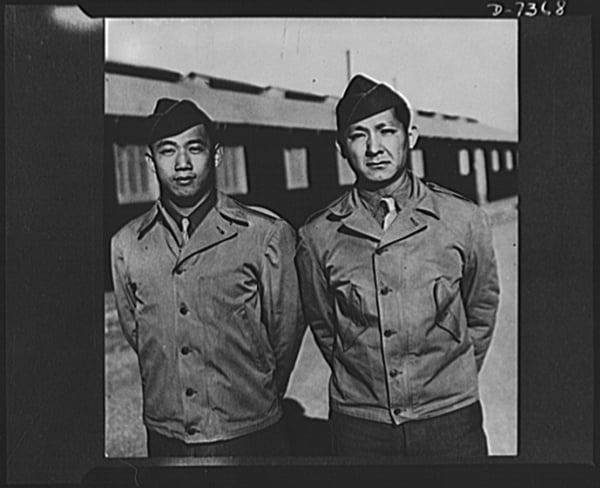 The first Chinese Americans to be commissioned second lieutenants in the Medical Administrative Corps Officers Candidate School via Library of Congress
The first Chinese Americans to be commissioned second lieutenants in the Medical Administrative Corps Officers Candidate School via Library of Congress
Finally, educate yourself. Read books about the AAPI experience; watch documentaries; attend workshops or talks hosted by AAPI organizations! Google is a great place to start if you don’t understand a topic (just make sure to verify your source).
Moving Forward
For those who might have lingering questions or still feel “put off” by the movement, get curious about what’s putting you off, ask yourself reflective questions, dig a little deeper to understand where these feeling of discomfort are coming from. We are not our thoughts, we are the awareness beneath them. So making space to reflect, understand and learn is an important way to show up for yourself and for others. Making time to find the right tools and resources is key. Keep it simple and start with Google; there are tons of organizations and activists that educate on all topic relating to race, marginalization, etc. Since we need to start somewhere, learning about history is a great starting point.
You can also start with this blog post by Joy celebrating API Heritage Month this year!
We live in an era of change and no matter where you start, we all have the opportunity to be a part of making a positive impact on the world around us.
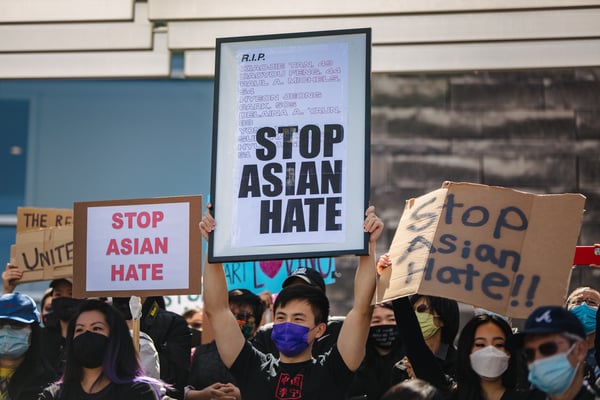



Leave a comment